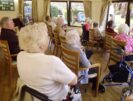
Wednesday 17th June 2020
Churches connecting across ages
Links between generations form an important part of church life. Carl Knightly from our partner charity Faith In Later Life explores ways to support older church members
At the start of this year (which feels an age ago!) the report ‘United for All Ages’ found that Britain was one of the most age-segregated countries in the world, with divisions between generations increasing over the last decade. As we see in our communities, people often have little contact with other generations. Children will know their friends, their parents’ friends and their grandparents, but are far less likely to know people of other ages. They miss out on seeing first-hand the milestones in the years ahead of them – the first jobs, weddings, christenings, funerals. They miss out on mentors and role models.
Compare this to children who grow up in churches. Churches, more than any other community network, gathering or organisation, give opportunity for different ages to learn and grow together. We believe as Christians that we are one body with different parts. There is a beauty in different ages worshipping together.
At Faith in Later Life I get the opportunity to tell this story in the public space, and to show the world how the church is doing well at this.
Take Geoff (72), for example, a retired grandparent. Geoff says, “When they asked for volunteers for the church holiday club my heart was beating fast in my chest because I knew God was telling me to do it, but I was scared, so I ignored it. I didn’t think they’d want an old chap like me. Then the next time the same thing happened. Finally, I signed up. It’s been wonderful.” The children really enjoy having him around. It is a picture of the wonderful intergenerational diversity of the church. This is exactly what we want to encourage through Faith in Later Life.
Covid-19 has created a far greater challenge for churches in intergenerational ministry. Without events to share together, without being able to visit people in their homes, churches have had to step up in new creative ways to make sure all generations are connected and spiritually encouraged.
On the Faith in Later Life website, we have been publishing a series of resources, articles and blogs to help churches tackle this significant shift.
For example, we’ve been looking at ways churches can connect with people of other ages and situations through ‘telephone trees’, calling not just to ask “How are you?” but also to ask other questions which might elicit a more meaningful answer, like “What is life like for you at the moment?”, “What can I be praying for you?” and “In what ways are you finding it difficult to do what needs to be done?”. This is more open than “How can I help?”, and enables people to describe the need they feel in their own way, without having to directly ask. Younger people can learn from older people about ‘physical distancing’ too. As Pastor Brian Croft wrote on Twitter:
The elderly members of my church have reminded me the isolation many of us are experiencing for the first time is what they face all the time.
We’ve been exploring how technology can create an additional barrier, particularly for those without the internet. For this issue we’ve given advice on how churches can get round this by setting up recorded talks to play over a normal landline, or setting people up with simple WiFi and devices. Mary, 96, has learned to Skype as a result of coronavirus and Annie (74), was delighted at seeing the faces of some of the children from church surprise her via WhatsApp video call, showing her their schoolwork.
All of these articles can be explored more on the Faith in Later Life blog. There is also a section on the Resource Hub particularly on coronavirus. As Kate Nicholas writes in her excellent guest blog (entitled The Second Naivete), “God lays the responsibility for the faith of the next generation firmly in the hands of those who have the necessary life experience and maturity, recognising the value and contribution of the depth of wisdom that comes with faith later in life. But it is only when we embrace the value of our lived experience, that we will in turn be able to help the next generation to find their own maturity in faith.”
For resources and information do visit www.faithinlaterlife.org
This article appears in the latest issue of The Pilgrims' Magazine


































